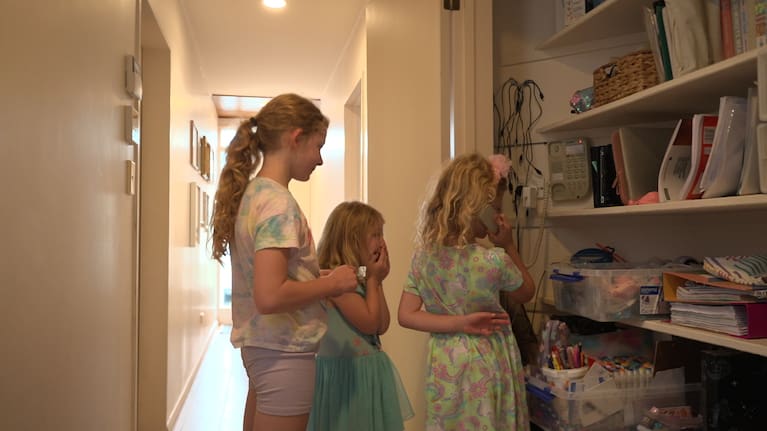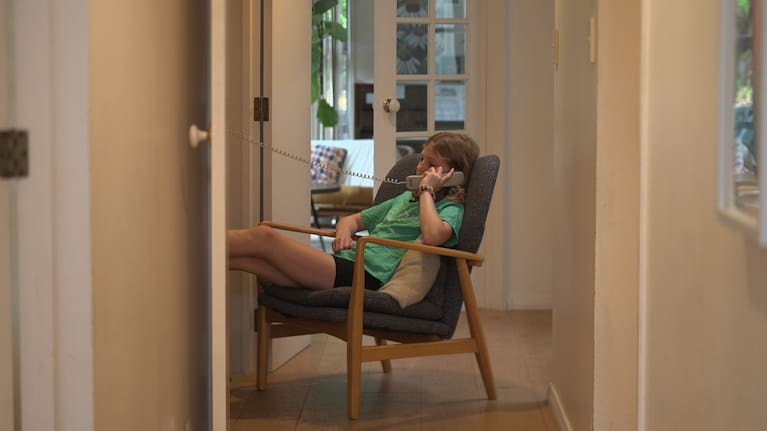Tired of the pressures and dangers that smart phones bring, some parents are making a return to the phone on the wall.
Readers of a certain vintage will recall when the simple act of phoning a friend could require an awkward conversation with their mum or dad who had the option of saying, "Sorry, he's doing his homework".
Such was the power parents held back then. And, for the kids of that era, such were our social skills. We might not have thought we were anything special – chatting on the phone to a different generation but, according to clinical psychologist Jacqui Maguire who works with a lot of businesses, that ability is increasingly rare.

Phone conversation fosters skills that trading emojis just can’t, she says. “Empathy, being able to talk in real time, being able to regulate, being able to pick up on whether someone wants you to talk more or pull back,” says Maguire. “They're really critical skills that we're actually seeing young adults missing.”
Some parents are considering a return to the phone on the wall amid the pressures and dangers of the smartphone. (Source: Seven Sharp)
Keeping smartphone issues at bay
Of course, for parents under pressure to buy their kids smartphones at ever-decreasing ages, lousy phone manners are the least of a long line of concerns. Online bullying, social anxiety, depression, lack of concentration, falling academic ability, poor body image and phone addiction – all of these problems can occur with smart phones.
For Summer Haycock, an Auckland mother of four girls aged 4 to 12, having a landline is a simple way of holding smartphones and the risks they bring at bay.

Not that that’s what she was thinking four years ago when she first had the landline installed. Back then she’d started worrying about the event of an emergency. "And only phone in the house was mine,” she explains. Her phone was kept on a high shelf to stop her young children from using it to take “500 selfies”. But what if they found themselves alone and needing to call someone?
So the family installed a trusty old push-button landline and taught the girls how to call 111, or Dad, or Grandma. And even though that feared emergency hasn't happened, at just $5 per month on top of their regular Wi-Fi bill, the phone delivers relatively cheap peace of mind. Plus it’s starting to bring other benefits.
"We kind of inadvertently have found this really fun side,” says Summer. “Which is that the girls use it to call their friends. It has this added entertainment value.”

The landline brings the kids freedom, social connection and conversational skills, she says.
And it delays the inevitable pressure on Summer to buy her eldest a smartphone. “I'm definitely wary of smartphones,” she says. “Especially what we know now and the research that's been coming out about social media.”
Bringing teens into the light
Summer knows the landline won’t suffice forever as it did for the teens of yore. “In the long term it's not going to solve all the problems,” she says. “But in the interim it's still been really great."
Jacquie Maguire, who is a mother of three, says the principal of her children’s school has also noted the landline as a growing trend.
To Maguire, who stresses the importance of friendship and freedom for the mental and physical health of kids, it’s a good option. “When you think about the rise in anxiety, depression, sleep disturbances, online bullying, exposure to unhelpful or dangerous content for young people, you can see how it would make sense for parents who are going, 'how do we bring our communication and our content out of bedrooms, out of bathrooms, and back into a shared living space?'
"We want our young people to be able to talk to their friends or arrange meet-ups at the local park but let's do that in a way that's safe and where there's oversight from parents."
"From my perspective, I think it's a smart move."



















SHARE ME